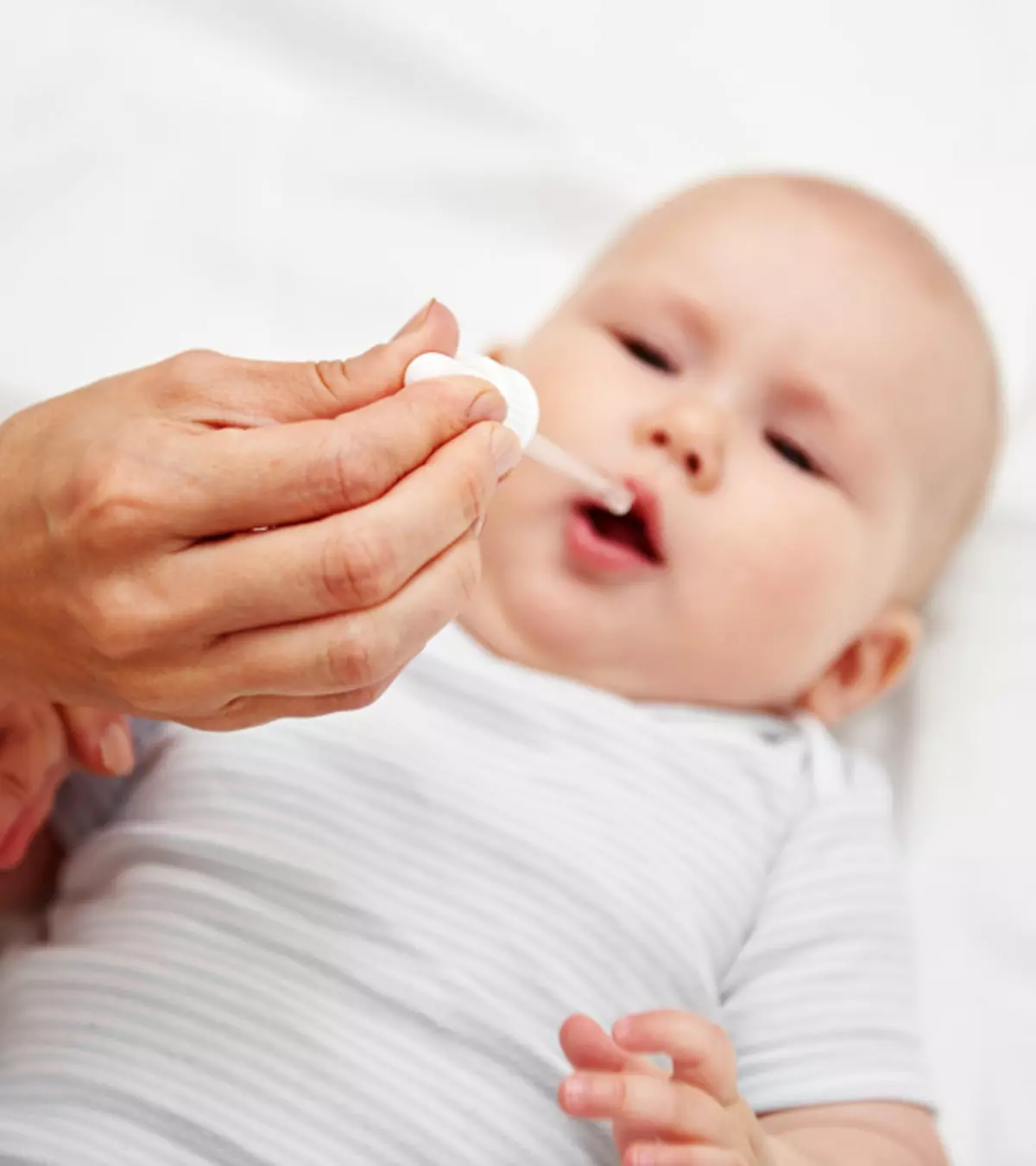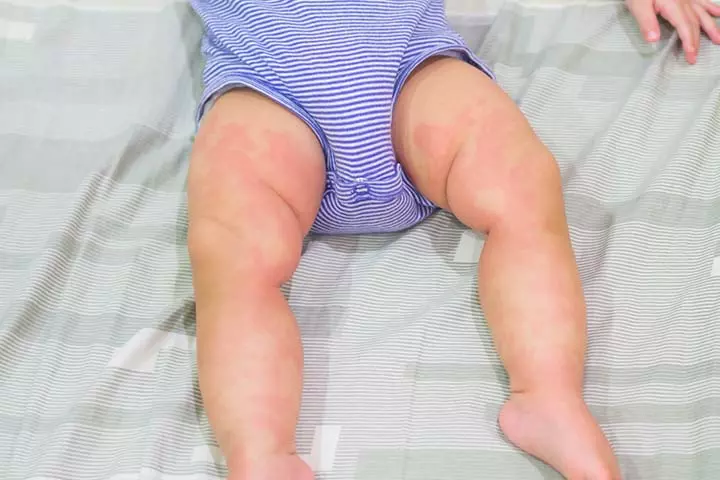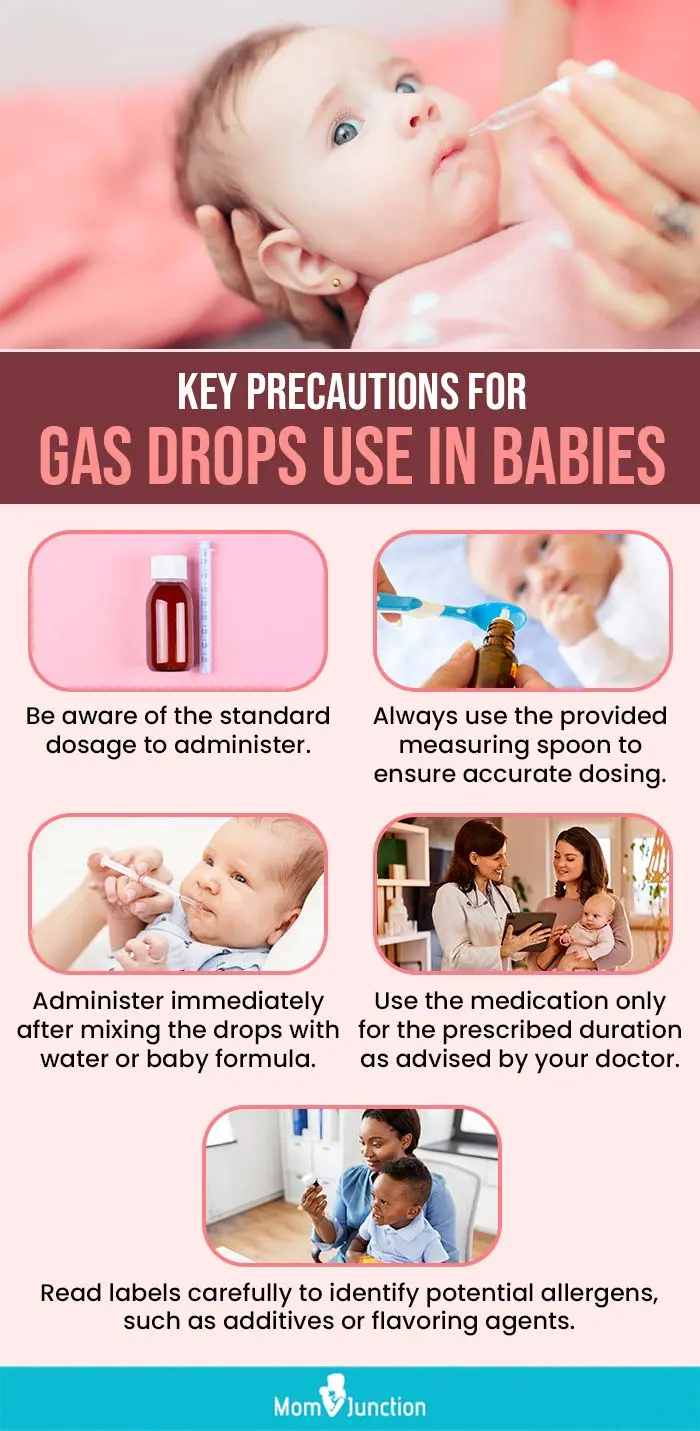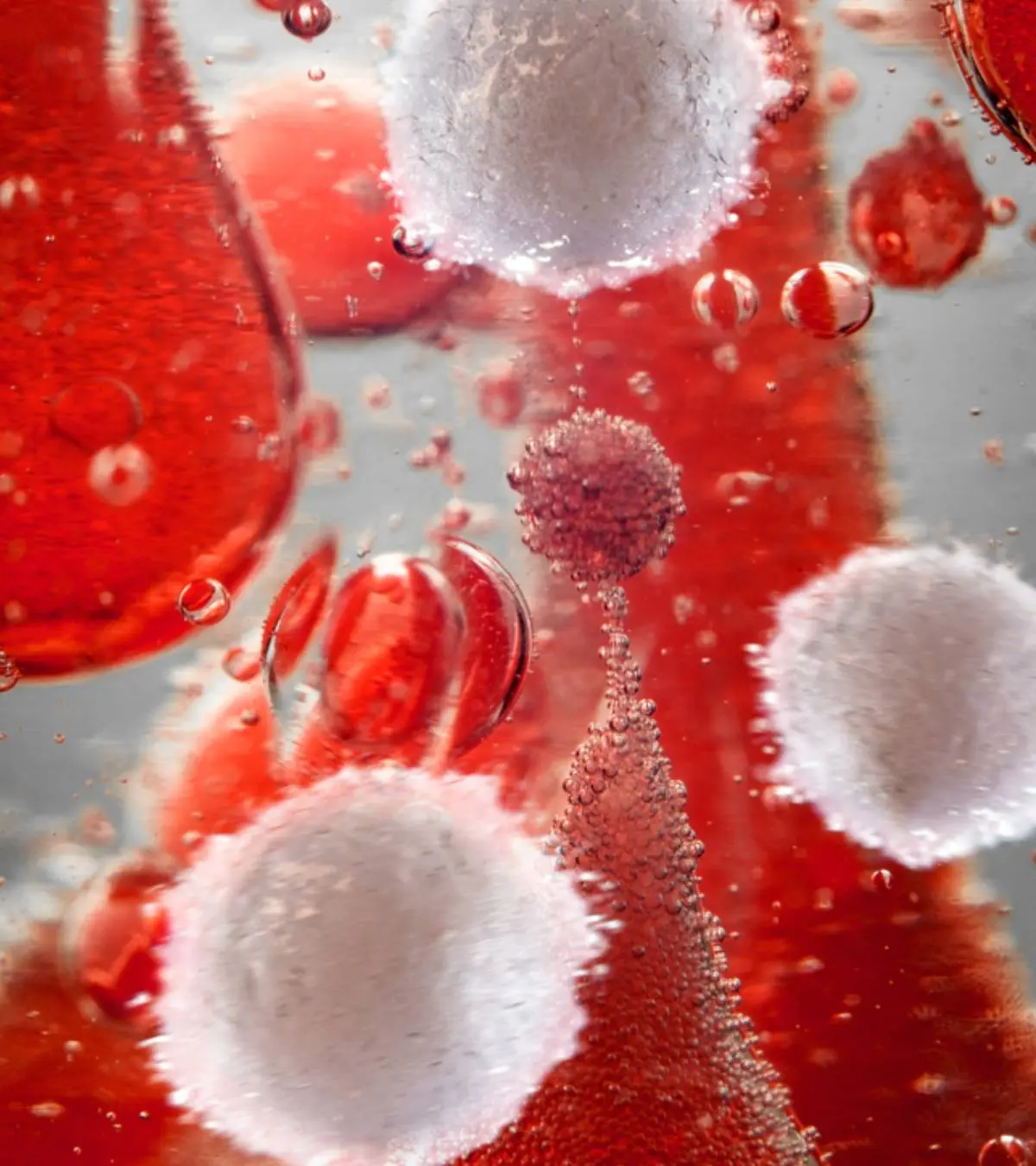
Image: Shutterstock
Intestinal gas is common in babies and is caused by their immature digestive systems. Gas is a leading cause of colic in infants (1). Therefore, gas drops for babies are commonly used to relieve excess gas and abdominal discomfort.
Babies may cry, especially during the night, due to gas problems. In most cases, gas in babies is not a serious problem, and it subsides with time. However, excessive crying can interfere with a baby’s sleep and feeding patterns.
Read this post to know more about the safety and efficacy of gas drops in babies.
Key Pointers
- Gas drops are over-the-counter medications containing simethicone as an active ingredient, relieving gas in babies.
- These gas drops are administered orally or mixed with baby foods.
- Following the ingestion of baby gas drops, some babies may develop breathing difficulties or swelling of the lips and tongue.
- Gas drops are not FDA-approved and hence consult your pediatrician before administering them to your baby.
- Massaging and burping are a few alternatives to gas drops.
What Are Gas Drops?
Gas drops are over-the-counter (OTC) liquid medications used for relieving gas in babies. It contains simethicone, a silicone latex that disperses and prevents gas bubbles from forming in the gastrointestinal tract (2).
 Quick fact
Quick factHow Safe Are Gas Drops For Babies?
As gas drops are available as OTC medication, the Food and Drug Administration (FDA) does not review and approve them. However, they are marketed if they comply with applicable regulations and policies (3).
Simethicone, the active ingredient in most gas drops, is non-toxic and is not absorbed by the body. So, it is considered safe for infants and newborns (4). However, it may cause loose stools in some babies (5).
If your baby has severe gas that makes them fussy and irritable, consult your pediatrician promptly.
What Is The Recommended Dose For Babies?
It is best to follow the dosage prescribed by your pediatrician. The standard dosage for children and infants less than two years is 20mg orally four times daily (6). According to Dr. Leah Alexander, a pediatrician from Fairview, New Jersey, “It is recommended to administer gas drops to children under two only four times a day, with approximately six hours between doses if necessary. If a baby’s gas symptoms do not improve or seem to worsen while taking gas drops, parents should contact their baby’s healthcare provider.”
Here is the dosage chart (3)
| Age (yr) | Weight (lb) | Dose (ml) |
| Infants under two | Under 24 | 0.3 |
| Children over two | Over 24 | 0.6 |
How To Administer Gas Drops For Babies?
Gas drops containing simethicone work best when they are taken after meals or at bedtime.
Always use the measuring spoon provided with the medicine to get an accurate measurement.
You can administer the medication orally, with the help of either a spoon or a dropper. Pour the liquid slowly, and aim for the sides of the mouth to prevent choking or spitting.
It can also be mixed with 30ml (1oz) of water, baby formula, or other liquids to make it easy for your baby to swallow (3) (7).
How Effective Are Gas Drops?
A study conducted on 51 healthy infants aged between two and 12 weeks to prove the efficacy of simethicone in infant colic relief treatment found that 78% of them showed improvement, and the symptoms resolved after one day of treatment using simethicone. In 85%, the same results were obtained after seven days (8). A noticeable reduction in fussiness and improved sleep in your baby are subtle indications that the gas drops are effective.
What Are The Side Effects Of Gas Drops?
Although the side effects are rare, some babies may exhibit the following symptoms when they are allergic to the medication.
- Hives

Image: Shutterstock
- Swelling of the lips, tongue, and throat
- Difficulty in breathing (7)
If you notice any of these reactions in your baby, stop using the medicine and seek medical advice.
 Quick fact
Quick factWhat Are The Precautions To Be Taken?

Image: Shutterstock
It is advisable to take the following precautions while administering gas drops to your baby.
- Always use the measuring spoon provided to ensure you measure the correct dosage.
- If you have mixed the medication with water or baby formula, use it immediately.
- Ensure you do not exceed the standard dose.
- Although it is relatively safe, use the medication only for a limited time as prescribed by your doctor.
- Some gas drop formulations may have harmful additives or flavor agents, which might cause allergic reactions in babies. So, always read the labels carefully before administering the medication.
 Quick tip
Quick tipAre There Any Alternatives To Gas Drops?
In the initial stages, you could consider alternative remedies to relieve the gas discomfort in babies.
1. Probiotics
Probiotics are good bacteria that can help your baby digest food better. A study on 589 infants found that oral supplementation of Lactobacillus reuteri during the first three months of life reduced the onset of colic, gas, and functional constipation (9).
2. Massaging

Image: Shutterstock
Gently massaging your baby’s tummy or bicycling their legs may help in releasing the trapped gas.
3. Burping
This could be a good way to release any trapped gas in your baby’s tummy while feeding. Make sure to burp your baby after each feeding. If your baby cries after feeding, be sure to burp them after each meal.
Frequently Asked Questions
1. What is the difference between gripe water and gas drops?
Gripe water and gas drops are over-the-counter liquid supplements used to treat infant colic and gas. However, gripe water for babies contains various herbs, sugars, extracts, and baking soda (sodium bicarbonate), which can have side effects. Hence, long-term use in high doses can be harmful to babies. Meanwhile, gas drops contain simethicone, an anti-foaming agent used to break up the gas that has no known side effects (10). Dr. Alexander opines, “In my clinical opinion, gas drops are more effective and safer than gripe water. My concern with gripe water is the lack of a consistent formulation. Some gripe waters may include ingredients like sodium bicarbonate or alcohol, which are unsafe for infants.”
2. Do infant gas drops work immediately?
No, gas drops typically work within 30 minutes of administration by combining small gas bubbles in the gut to form larger bubbles, allowing trapped air to pass more easily through the body (11).
3. Can consuming too many gas drops hurt a baby?
Infographic: Precautions For Giving Gas Drops To Babies
Gas drops are over-the-counter liquid medications used to relieve gas troubles in infants. If you have been advised to use this medication for your baby’s gas issues, it is vital to follow specific precautions during administration. Refer to the infographic below for essential safety tips and key factors to consider when using gas drops for babies.

Illustration: Momjunction Design Team
Gas problems might make a baby irritable, thereby disturbing their sleep and making them even more cranky. In such cases, you may use baby gas drops after seeking a pediatrician’s advice. The FDA does not regulate these OTC, so their safety is not assured. But if the doctor approves the gas drops, only administer the suggested dosage. Alternatively, you may try a few home remedies to relieve babies from gas. Gas drops can be replaced by immediate burping after a meal and a gentle tummy massage. Also, check with your pediatrician about the reasons behind the gas accumulation and take preventive measures as suggested.
Illustration: Baby Gas Drops: Uses Dosage Interactions And Side Effects

Image: Dall·E/MomJunction Design Team
Are you concerned about giving your 4-month-old baby gas drops or tablets? Discover the answers in this video, where we explore the potential risks and benefits.
References
1. Dámaso Infante, Oscar Segarra, and Bernard Le Luyer; Dietary treatment of colic caused by excess gas in infants: Biochemical evidence; World Journal of Gastroenterology (2011).
2. Alex L. Rogovik and Ran D. Goldman; Treating infants’ colic; Canadian Family Physician (2005).
3. Infants Gas Relief Drops – simethicone emulsion; National Institutes of Health
4. Colic and crying – self-care; MedlinePlus – National Institutes of Health
5. Mayo Clinic Q and A: Gas Drops for Fussiness; Mayo Clinic
6. Simethicone; Stat Pearls
7. simethicone; Regents of the University of Michigan
8. Becker et al.; Mylicon drops in the treatment of infant colic; Clinical Therapeutics (1988).
9. Flavia Indrio et al.; Prophylactic Use of a Probiotic in the Prevention of Colic, Regurgitation, and Functional Constipation – A Randomized Clinical Trial; JAMA Pediatrics (2014).
10. Why Is Your Baby Fussing?; Breastfeeding USA.
11. Simeticone; NHS
12. Gas Drops; Missouri Poison Center.
13. Infants Gas Relief 40 mg/0.6 mL oral drops,suspension; Kaiser Permanente
Community Experiences
Join the conversation and become a part of our nurturing community! Share your stories, experiences, and insights to connect with fellow parents.
Read full bio of Dr. Tashawna Stokes
- Dr. Leah Alexander is a board-certified pediatrician who provides medical care in an outpatient setting in Fair Lawn, New Jersey. She has also been working as a pediatrician with Medical Doctors Associates at Pediatricare Associates, New Jersey, since 2005. Dr. Alexander holds a bachelor's degree in Health Science from Kalamazoo College and a Doctor of Medicine degree from Michigan State University.
 Dr. Leah Alexander is a board-certified pediatrician who provides medical care in an outpatient setting in Fair Lawn, New Jersey. She has also been working as a pediatrician with Medical Doctors Associates at Pediatricare Associates, New Jersey, since 2005. Dr. Alexander holds a bachelor's degree in Health Science from Kalamazoo College and a Doctor of Medicine degree from Michigan State University.
Dr. Leah Alexander is a board-certified pediatrician who provides medical care in an outpatient setting in Fair Lawn, New Jersey. She has also been working as a pediatrician with Medical Doctors Associates at Pediatricare Associates, New Jersey, since 2005. Dr. Alexander holds a bachelor's degree in Health Science from Kalamazoo College and a Doctor of Medicine degree from Michigan State University.
Read full bio of Rohit Garoo
Read full bio of Dr. Ritika Shah
Read full bio of Vidya Tadapatri

















